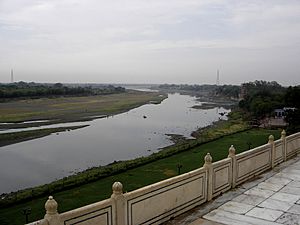Yamuna facts for kids
The Yamuna River (also called Jamuna or Jumna) is a very important river in North India. It is one of the longest rivers in India and a main branch of the famous Ganges River. The Yamuna flows for about 1,376 kilometers (855 miles).
The river starts high up in the Himalayas at a place called Yamunotri. This spot is in the Uttarkashi district of Uttarakhand, India. From there, it travels through several Indian states, including Uttarakhand, Haryana, Delhi, and Uttar Pradesh. Finally, the Yamuna joins the Ganges River at a special place called Triveni Sangam in Prayagraj (formerly Allahabad).
Many important cities are located along the Yamuna River, such as Yamuna Nagar, Delhi, Mathura, and Agra. The river is very important for farming, providing water to many people and fields.
Contents
Where the Yamuna River Starts
The Yamuna River begins its journey high in the Himalayas. Its source is at a glacier called Yamunotri, which is part of the Banderpooch peaks. This area is in the Uttarkashi district of Uttarakhand, India. The starting point is about 3,293 meters (10,804 feet) above sea level.
The River's Journey
After starting in the mountains, the Yamuna flows south through the Lower Himalayas. It then enters the Indo-Gangetic Plain, which is a large, flat area. As it flows, many smaller rivers join it. These smaller rivers are called tributaries.
Main Tributaries
The Yamuna River has several important rivers that flow into it.
- The Tons River is the largest tributary. It joins the Yamuna from the left side.
- Other important rivers that join the Yamuna from the right side include the Chambal, Betwa, and Ken rivers.
- From the left side, other rivers like the Hindon and Sarda also join the Yamuna.
Cities Along the Yamuna
The Yamuna River passes through or near many important cities in India.
- In Haryana, it flows near Yamuna Nagar.
- It then reaches Delhi, the capital of India.
- Further downstream, it flows past Mathura and Agra in Uttar Pradesh. The famous Taj Mahal in Agra is built on the banks of the Yamuna.
- Other cities like Etawah and Kalpi are also located along the river.
Where the Yamuna River Ends
The Yamuna River's long journey ends when it meets the Ganges River. This meeting point is called the Triveni Sangam and is located in the city of Prayagraj (formerly Allahabad) in Uttar Pradesh. The word "Triveni Sangam" means "three-river confluence," as it's believed that a mythical third river, the Saraswati, also joins them here. This spot is considered very holy by many people in India.
Importance of the Yamuna River
The Yamuna River is very important for many reasons:
- Water Source: It provides water for drinking, farming, and industry to millions of people.
- Agriculture: The river helps irrigate vast farmlands, especially in the states of Haryana and Uttar Pradesh. Canals built from the Yamuna help carry water to these areas.
- Culture and Religion: The Yamuna is considered a sacred river in Hinduism. Many temples and holy sites are located along its banks. It plays a big role in many ancient stories and traditions.
- Wildlife: The river and its surrounding areas are home to various types of plants and animals.
Gallery
Related pages
Images for kids
-
Yamuna river between Saharanpur and Yamunanagar
-
Course of Yamuna, in the Indo-Gangetic Plain
-
Vasudev carrying baby Lord Krishna across the Yamuna, an important legend of Bhagavata Purana.
-
Taj Mahal is situated on the banks of river Yamuna.
-
The Yamuna near the Himalayas, just as it reaches the plains, beyond Dehradun in Uttarakhand
See also
 In Spanish: Río Yamuna para niños
In Spanish: Río Yamuna para niños
 | James B. Knighten |
 | Azellia White |
 | Willa Brown |


















